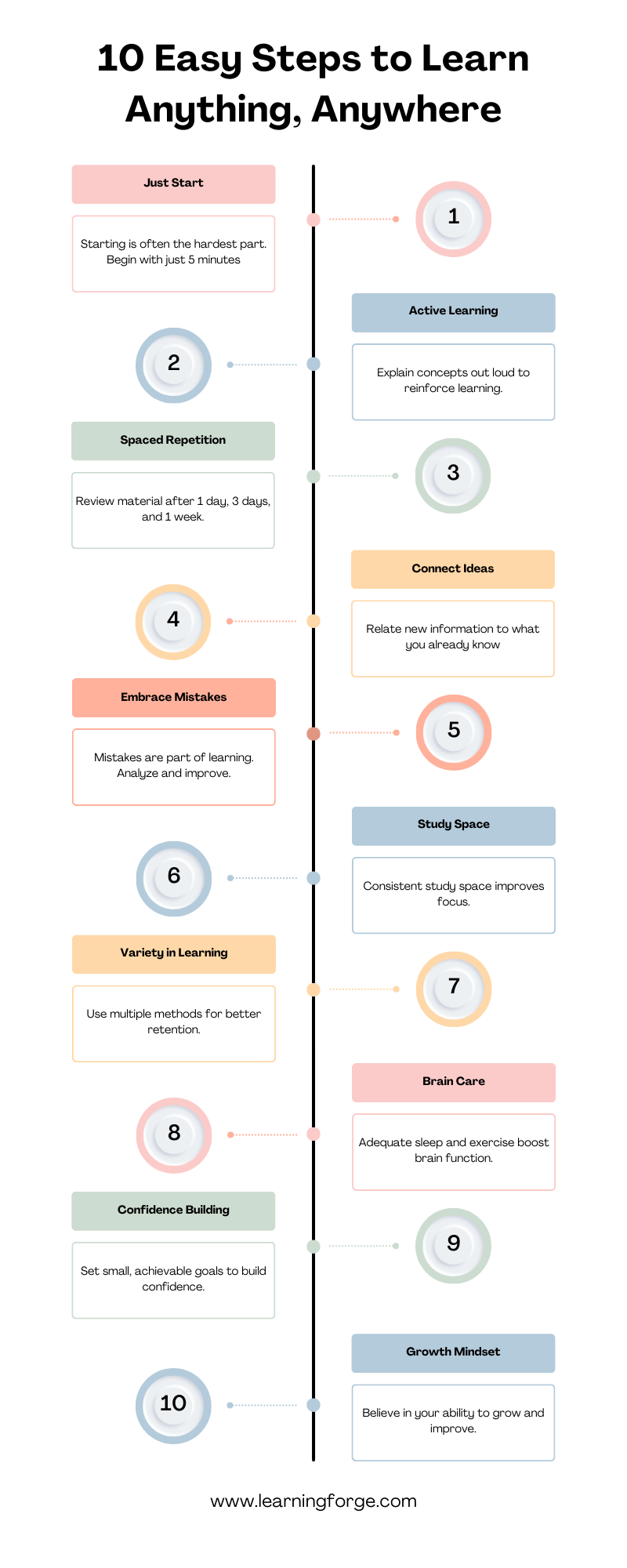A Guide to Real Study Strategies that just work
Have you ever felt overwhelmed when trying to learn anything new? Maybe you’ve stared at a textbook, feeling lost and wondering if you’ll ever “get it.” Or perhaps you’ve started an online course with enthusiasm, only to find yourself struggling to keep up after a few weeks. You might even have convinced yourself that you’re just not capable of learning certain subjects. If this sounds familiar, you’re not alone, and more importantly, you’re not incapable – you just haven’t been taught how to learn anything effectively.
The truth is, most of us were never taught how to learn effectively. Our schools and colleges focus on what to learn, but rarely on how to learn. We’re expected to figure it out on our own, often through trial and error. Some of us manage to stumble upon effective strategies, while others continue to struggle, feeling like they’re just not “cut out” for learning certain subjects.
The Learning Secret Your Teachers Missed
But here’s the good news: You can learn anything. Yes, anything. Whether it’s a new language, a complex scientific concept, a musical instrument, or a professional skill, the ability to learn is within your reach. The secret lies not in innate talent or intelligence, but in knowing how to learn effectively.
Think about it. How different would your life be if you could confidently approach any new subject or skill, knowing you have the tools to master it? What opportunities would open up if you could learn anything you set your mind to?
That’s what this guide is all about. We’re going to explore ten proven strategies that can transform the way you learn. These aren’t just theoretical concepts – they’re practical techniques used by successful learners across various fields, from Nobel Prize winners to Olympic athletes, from bestselling authors to tech innovators.
The best part? These strategies work regardless of your age, background, or the subject you’re trying to learn. Whether you’re a student aiming to ace your exams, a professional looking to upskill, or simply someone who loves to learn, these techniques can help you unlock your full learning potential.
So, are you ready to discover how to learn anything? Let’s dive in and explore the secrets of effective learning that your teachers probably never told you about.
10 Simple Ways to Supercharge Your Learning
1. Just Start (Even If You Don’t Feel Ready)
You know what’s usually the toughest part of any task? Starting. But here’s a cool trick: once you begin, it’s way easier to keep going. It’s like a learning version of Newton’s first law of motion!
Take J.K. Rowling, for instance. When she first started writing Harry Potter, she was a single mom just trying to make ends meet. Instead of waiting for the “perfect moment” (spoiler alert: it never comes), she started jotting down ideas on napkins during her train rides. Those little scribbles? They turned into one of the most successful book series ever.
Try this: Set a timer for just 5 minutes and start working. Chances are, once you get going, you’ll want to keep at it. Who knows? Your 5-minute start could be the beginning of your own Harry Potter-level success story!
2. Make Your Learning Active (Get Your Brain in the Game)
Forget passively re-reading your notes or zoning out during online lectures. It’s time to get your brain in the game with active recall. This strategy is like a workout for your mind – it forces your brain to retrieve information, making those neural pathways stronger and helping you remember stuff long-term.
Check out how actor Ryan Reynolds prepped for his role as Deadpool. He didn’t just read his lines over and over. Nope, he challenged himself to recite them in all sorts of wild situations – while cooking, working out, even in the shower! This active approach not only helped him nail his lines but also made his performance feel super natural on screen.
Try this: Next time you’re wrestling with a tricky concept, try explaining it out loud as if you’re teaching someone else. Bonus points if you can explain it while doing jumping jacks or cooking dinner, Reynolds-style!
3. Space Out Your Learning (No All-Nighters Required)
Cramming the night before? So last season. Spread out your study time over days or weeks instead. This technique, called spaced repetition, works with your brain’s natural learning process, helping move info from your short-term memory to your long-term memory.
Look at the language learning app Duolingo. Their whole system is built on this spaced repetition principle. Users review words and phrases at increasing intervals, cementing the information in their long-term memory. It’s helped millions of people (including celebs like Jack Black and Katy Perry) successfully learn new languages.
Try this: After learning something new, review it after 1 day, then 3 days, then a week. It’s like giving your brain little reminders, helping it store the info for the long haul.

4. Connect New Ideas to Things You Already Know
Your brain is like a giant web of information. When you connect new concepts to stuff you already know, you’re adding to that web and making it easier for your brain to find and remember the new info later. This strategy is called elaborative rehearsal, and it’s like creating a mental map of knowledge.
Elon Musk is a pro at this. When he’s explaining complex rocket science stuff, he often uses everyday analogies. He once compared landing a rocket to “trying to balance a rubber broomstick on your hand in the middle of a wind storm.” By linking the unfamiliar (rocket landing) to the familiar (balancing a broomstick), he makes the concept stick in your mind.
Try this: When you’re learning something new, think about how it relates to your daily life or something you already understand well. The more connections you make, the better you’ll remember it.
5. Fail Forward (Embrace Those Mistakes!)
Getting things wrong isn’t a setback – it’s part of the journey! This approach is all about productive failure. When you make mistakes and correct them, you’re actually creating stronger neural pathways than if you’d just memorized the right answer from the start.
Take it from Michael Jordan, arguably the GOAT of basketball. He famously said, “I’ve missed more than 9000 shots in my career. I’ve lost almost 300 games. Twenty-six times I’ve been trusted to take the game-winning shot and missed. I’ve failed over and over and over again in my life. And that is why I succeed.” Each missed shot was a learning opportunity that ultimately led to his legendary status.
Try this: Next time you get something wrong, don’t just move on. Take a moment to understand why it was wrong and how to fix it. It’s these “oops” moments that can lead to your biggest breakthroughs.
6. Set Up Your Study Space (Location, Location, Location)
Believe it or not, where you study can make a huge difference in how well you learn. It’s all about context-dependent memory – your brain associates information with the environment where you learned it. So by choosing a consistent, distraction-free space, you’re giving your brain a helping hand.
Take a page from author Dan Brown’s book (pun intended). The creator of “The Da Vinci Code” has a super specific writing routine. He wakes up at 4 AM, makes a smoothie, and starts writing in his study. He even uses inversion therapy (hanging upside down) to help him focus. While you don’t need to go to such extremes, having a dedicated study space can help you get in the zone because your brain knows it’s time to get down to business.
Try this: Experiment with different study spots and times to see what clicks for you. Once you find your ideal setup, stick to it. Your brain will start to associate that environment with focused learning, making it easier to concentrate each time you settle in.
7. Mix Up How You Learn (Variety is the Spice of Learning)
Don’t get stuck in a one-trick pony routine when it comes to studying. Try different methods to understand and remember better. This approach, known as multimodal learning, engages different parts of your brain, creating more neural pathways to the information and improving your overall understanding and retention.
Look at how Leonardo DiCaprio prepped for his role in “The Revenant.” He didn’t just read the script and call it a day. He dove headfirst into the character’s world – learning survival skills, studying Native American history, and even sleeping in animal carcasses (yep, you read that right). By engaging multiple senses and learning methods, he delivered an Oscar-winning performance that felt incredibly authentic.
Try this: While we’re not suggesting you sleep in animal carcasses, try combining different learning methods. Read about a topic, watch a video on it, then draw a simple picture or diagram to summarize it. This multi-faceted approach can lead to a deeper, more lasting understanding.

8. Take Care of Your Brain (Feed the Machine)
Your brain works best when you’re well-rested and active. It’s like taking care of a high-performance machine – you need to give it the right fuel and maintenance to keep it running smoothly.
Jeff Bezos, the founder of Amazon, is big on this. He aims for eight hours of sleep each night, believing it boosts his productivity and decision-making skills. He also makes time for regular exercise, which helps him maintain his energy levels and keep his mind sharp.
Try this: Aim for 7-9 hours of sleep and try to squeeze in at least 30 minutes of exercise each day. Your brain will thank you, and you might find yourself as productive as a tech billionaire!
9. Build Your Confidence (Believe in Your Brain Power)
Believing in yourself can make a world of difference in how well you learn. It’s all about self-efficacy – the belief in your ability to succeed. When you believe you can do it, you’re more likely to stay motivated, persevere through challenges, and ultimately perform better.
Take a leaf out of Serena Williams’ book. Despite facing numerous challenges and setbacks throughout her career, her unwavering self-belief and determination have driven her to become one of the greatest tennis players of all time. Each victory, no matter how small, built her confidence and fueled her drive to become the best.
Try this: Set small, achievable goals for yourself. Each time you reach one, take a moment to acknowledge your success. Over time, you’ll see how much you can achieve, building your confidence like Serena Williams did with each step of her journey.
10. Invest in a Growth Mindset (Your Brain is a Muscle – Exercise It!)
Remember, your ability to learn isn’t set in stone from birth. It’s like a muscle that can grow stronger with practice. This idea comes from Carol Dweck’s research on mindset. Having a growth mindset – believing that your abilities can be developed through effort – leads to a love of learning and the resilience needed for great accomplishments.
Thomas Edison, the genius behind the light bulb, is a perfect example of this. He faced countless failures before achieving success. But instead of giving up, he famously said, “I have not failed. I’ve just found 10,000 ways that won’t work.” His growth mindset and relentless pursuit of improvement led to his groundbreaking inventions.
Try this: Next time you face a challenge, instead of thinking “I can’t do this,” try “I can’t do this yet, but I’ll get there with practice.” This simple shift in mindset can open up a world of learning possibilities.
Your Turn to Shine
Now it’s your chance to put these tips into action:
- Reflect on how it changed your learning experience.
- Pick one idea from this guide that resonates with you.
- Use it when you study or learn something new this week.
- Gradually add more tips to your study routine.
Remember, becoming a learning pro takes time. Be patient with yourself and celebrate those small wins along the way.
The Road Ahead
As you start incorporating these learning hacks into your routine, remember that every expert was once a beginner. The strategies we’ve discussed are the same ones used by successful learners across all fields. By consistently applying these methods, you’re not just preparing for your next test or project – you’re setting yourself up for lifelong growth and achievement.
So the next time you’re faced with a tough learning challenge, take a deep breath and remember: you’ve got this. Your capacity to learn is greater than you might think, and with these strategies in your toolkit, you’re well on your way to unlocking your full potential.
Ready to revolutionize your learning journey? Share your thoughts in the comments below! Which tip are you excited to try first? Let’s learn from each other and grow together!

Scientific References
- Spaced Repetition: Ebbinghaus, H. (1885). Memory: A Contribution to Experimental Psychology.
- Growth Mindset: Dweck, C. S. (2006). Mindset: The New Psychology of Success.
- Active Recall: Karpicke, J. D., & Roediger, H. L. (2008). The Critical Importance of Retrieval for Learning. Science.
